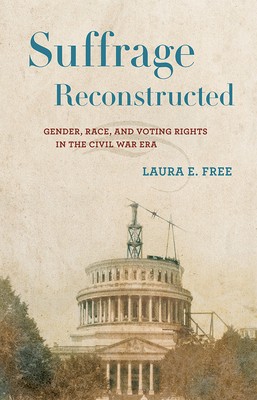| Suffrage Reconstructed: Gender, Race, and Voting Rights in the Civil War Era Contributor(s): Free, Laura E. (Author) |
|||
 |
ISBN: 1501748467 ISBN-13: 9781501748462 Publisher: Cornell University Press
Binding Type: Paperback - See All Available Formats & Editions Published: July 2020 |
||
| Additional Information |
| BISAC Categories: - Political Science | Political Process - Campaigns & Elections - History | United States - Civil War Period (1850-1877) - History | African American |
| Dewey: 324.620 |
| LCCN: 2015010883 |
| Age Level: 18-UP |
| Grade Level: 13-UP |
| Physical Information: 0.56" H x 6.14" W x 9.21" L (0.84 lbs) 248 pages |
| Themes: - Chronological Period - 1851-1899 - Ethnic Orientation - African American - Sex & Gender - Feminine - Topical - Black History - Topical - Civil War |
| Features: Price on Product |
| Descriptions, Reviews, Etc. |
| Publisher Description: The Fourteenth Amendment, ratified on July 9, 1868, identified all legitimate voters as "male." In so doing, it added gender-specific language to the U.S. Constitution for the first time. Suffrage Reconstructed considers how and why the amendment's authors made this decision. Vividly detailing congressional floor bickering and activist campaigning, Laura E. Free takes readers into the pre- and postwar fights over precisely who should have the right to vote. Free demonstrates that all men, black and white, were the ultimate victors of these fights, as gender became the single most important marker of voting rights during Reconstruction. Free argues that the Fourteenth Amendment's language was shaped by three key groups: African American activists who used ideas about manhood to claim black men's right to the ballot, postwar congressmen who sought to justify enfranchising southern black men, and women's rights advocates who began to petition Congress for the ballot for the first time as the Amendment was being drafted. To prevent women's inadvertent enfranchisement, and to incorporate formerly disfranchised black men into the voting polity, the Fourteenth Amendment's congressional authors turned to gender to define the new American voter. Faced with this exclusion some woman suffragists, most notably Elizabeth Cady Stanton, turned to rhetorical racism in order to mount a campaign against sex as a determinant of one's capacity to vote. Stanton's actions caused a rift with Frederick Douglass and a schism in the fledgling woman suffrage movement. By integrating gender analysis and political history, Suffrage Reconstructed offers a new interpretation of the Civil War-era remaking of American democracy, placing African American activists and women's rights advocates at the heart of nineteenth-century American conversations about public policy, civil rights, and the franchise. |
Contributor Bio(s): Free, Laura: - Laura E. Free is Associate Professor of History at Hobart and William Smith Colleges. |
| Customer ReviewsSubmit your own review |
| To tell a friend about this book, you must Sign In First! |